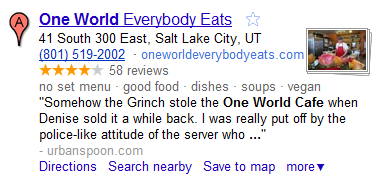Author
[email protected] [email protected]
Date published
June 15, 2011
Categories
Google is struggling to make its mark in the local scene in the aftermath of the failed Groupon buyout. Two brand new tactics in this effort are the city pages, which compile local “Places” and “Offers,” and descriptive terms in Google Maps results, which show what key phrases have been used most frequently to describe a local listing.
The Google City Pages (Beta)

Google has expanded beyond its Places framework by grouping all their local services into a city-based directory. Each city will get its own page, located at a site like Google.com/Portland. There are currently only a few cities (specifically: Austin, New York, Portland, and San Diego) where the pages are enabled, according to David Mihm.
The city pages include:
- A directory of local businesses, pulling all the information from Google Places.
- A “community” page that gives region-specific announcements from the Google Places team.
- A “business owners” control panel that compiles resources and local advertising options for local business owners.
- Daily offers from the Google Offers (beta) service.
For those unfamiliar with the new service, Google Offers functions much like other “daily deal” websites, but is integrated with the user’s Google account and completes transactions using Google Checkout.
Surprisingly, the city pages can be indexed and ranked in the normal search results. That could mean a very minor case of atomic warfare for Google, since this puts them in direct competition with sites like TripAdvisor and Yelp. These local business groups provide review and other data to Google and have a strong history of locking down that information when Google starts stepping on toes – which they’re doing here in a big way.
Descriptive Text in Local Listings
Beyond this beta “city pages” feature, Google has extended their description of local businesses in all Maps-oriented listings (e.g., actual Google Maps searches, Google Maps for Mobile, local listings on the SERP, etc.). The new feature examines all the reviews for a given business to find the most frequently used phrases. Those phrases are then pulled directly into the search listing, right below the star rating.

In the case of the example provided above, the descriptive terms make it clear that the location has no set menu, includes a selection of soups, and has vegan options.
What does this new feature mean for local businesses? Since there’s no real control over what words are displayed here, this means that PR management in the review sector has become even more important. This is the appropriate time to Google your own business and see what terms – good and bad – are being displayed for your company.

